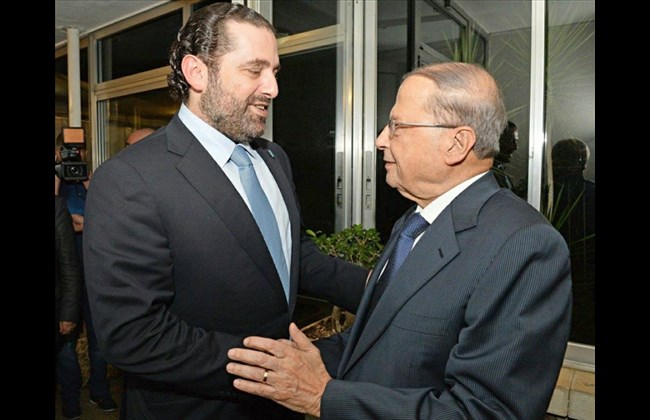Aoun awaits blocs’ responses to his presidential bid
Hasan Lakkis/The Daily Star/ October 06/16
Now that MP Michel Aoun has presented himself as a Christian leader and a serious candidate for the presidency, the heads of various political blocs must assess his position and take a decision either to elect him as a head of state, or to return to the labyrinth of “rumors and gossip” that has dominated the presidential election issue for more than two and a half years, political sources say. Parliamentary sources sympathetic with Aoun, the founder of the Free Patriotic Movement, described as “big” the reassurances he made to various blocs during a wide-ranging interview with the FPM-affiliated OTV station Tuesday night.
Aoun has also provided the required clarifications on the country’ security, the Taif Accord and Hezbollah’s arms, as part of his public commitment to the people, politicians and officials, the sources said.
With regard to other demands, such as the distribution of ministerial portfolios, Lebanon’s offshore oil and gas reserves, and administrative appointments, Aoun has not made any commitment, at least publicly, but this might happen behind the scene if he decided to make such a commitment, the sources added.
Concerning Aoun’s strained ties with Speaker Nabih Berri and other parties that oppose his presidential bid, the sources could not confirm that this problem could be solved, particularly in the case with Berri that has a personal nature.
In the OTV interview, Aoun did not want to embarrass Hezbollah, but left the door open to party leader Sayyed Hasan Nasrallah to use Aoun’s remarks in the TV interview in a positive way in his contacts and consultations with the Parliament speaker, even though Berri wanted a commitment from the party that the FPM founder would not bother him if he became a president, the sources said.
Berri, who staunchly opposes Aoun for president, is backing Aoun’s rival, Marada Movement leader MP Sleiman Frangieh, who also has the support of former Prime Minister Saad Hariri, MP Walid Jumblatt and some independent lawmakers.
Aoun said in the OTV interview that relations with Berri “should be good. There is no dispute between us in politics.”
The same sources saw no difficulty in Jumblatt being convinced of Aoun’s option for president if he became sure that Hariri has finally decided to go with this option.
However, parliamentary sources in the Future Movement said that the picture which Aoun presented during the OTV interview signaling that Hariri had reached an understanding with him over the presidential election is not accurate.
The sources said that former MP Mustafa Alloush, a senior Future official, reflected this situation when he said that although a number of the movement’s MPs gave Hariri freedom of decision, 80 percent who have been polled within the Future Movement’s public have rejected Aoun’s option for president.
While Aoun struck an upbeat note about the presidential election, hinting that his “positive” meeting with Hariri last week might eventually lead the Future Movement to support his bid for the country’s top Christian post, Berri was quoted as saying by visitors that the head of the Future Movement is still endorsing Frangieh’s candidacy.
Perhaps, the obstacle facing Aoun’s bid for the presidency which a number of leaders, particularly Berri, fear is that Aoun, if elected president, would be the first head of state since the 1989 Taif Accord who enjoys a weighty parliamentary bloc and that this bloc might increase its size if the current understanding between the FPM and the Lebanese Forces endures, political sources said.
With regard to the attitudes of Arab and foreign countries that exert influence in the presidential election, mystery still reigns. There is no public indication that any of these countries is siding with any of the two main rival candidates: Aoun and Frangieh.
But it appears that there is no longer any public veto on Aoun as was the case at the beginning of the presidential race in May 2014, when former President Michel Sleiman’s six-year term ended.
Yet, the ambiguity over the presidential election can only be cleared by Hariri’s final stance following his return to Beirut from visits to Riyadh and Moscow.






















